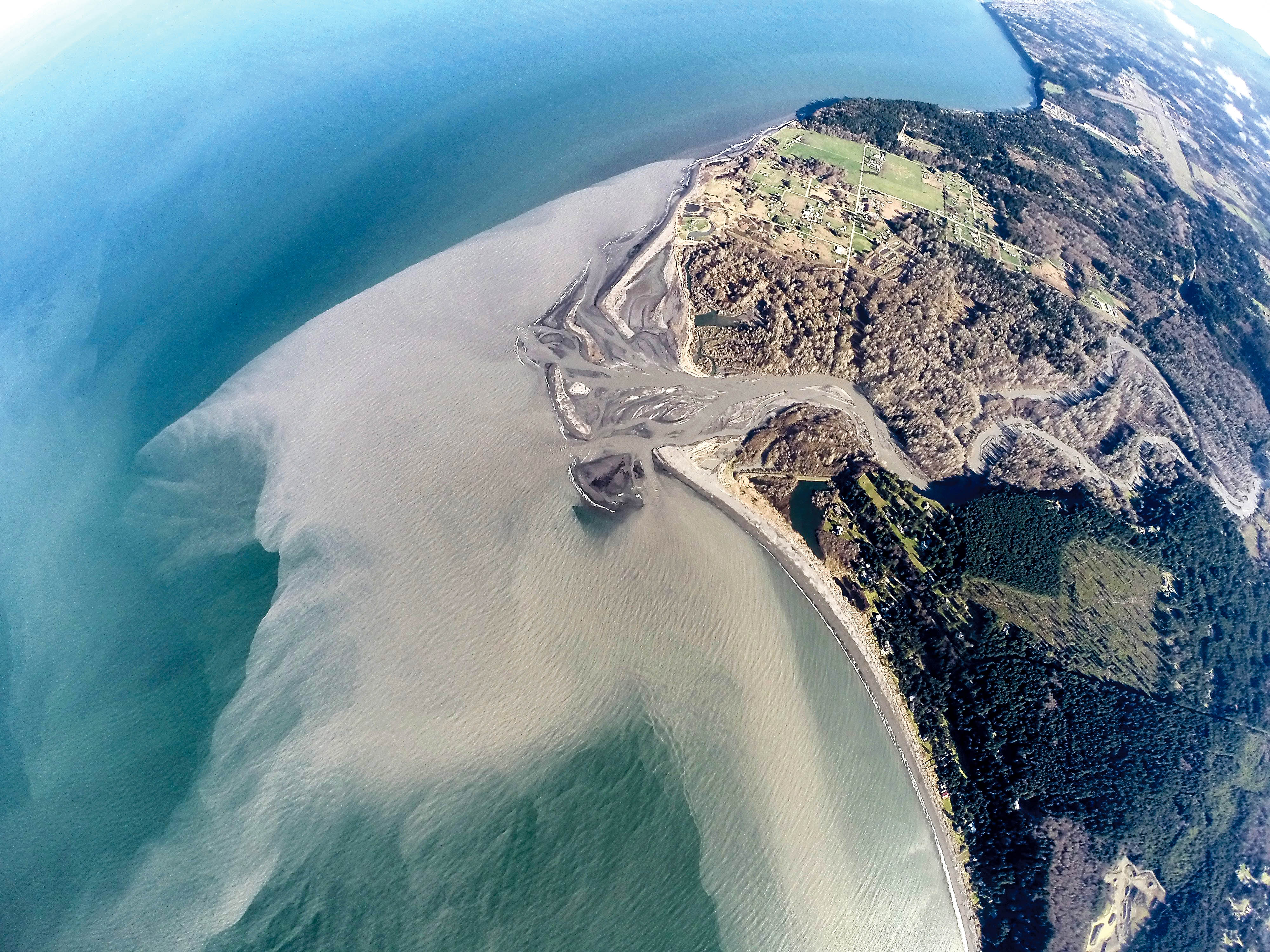PORT ANGELES — Changes to the Elwha River shoreline and nearshore and the creatures that depend on them will be in the spotlight during a free public forum and tour of the Elwha River mouth Saturday.
In the ninth annual gathering, the Elwha Nearshore Consortium — a group of citizens, scientists and managers dedicated to promoting and understanding the nearshore restoration associated with the Elwha River dam removals — will tell of changes that have occurred in the Elwha River mouth area east of Port Angeles.
In the Elwha River Restoration Project, which began in September 2011, the Elwha and Glines Canyon dams were demolished, freeing the river west of Port Angeles to return to its wild state.
The river had been dammed for 100 years. Sediment that had piled up behind the dams has flowed down the river, creating changes in the shoreline, feeder bluffs, habitats and fish use.
“About a third of all the sediment that was expected to arrive at the mouth of the river has arrived, so we are just at the beginning of the nearshore restoration associated with the Elwha dams removal,” said Anne Shaffer, executive director of the Coastal Watershed Institute.
“This process is going to be decades-long, but the changes we are seeing already are jaw-dropping,”she added.
“One of the goals of the project was to inform future dam removal projects, and that is also true for the nearshore,” said Shaffer, who defined the nearshore as being from the vegetated shoreline to a depth of 100 feet offshore.
“One of the things we are learning is how quickly we see a response,” she added.
A technical forum for scientists studying the river and residents directly impacted by changes to the nearshore zone begins today.
The public portion of the conference, “Evolving Elwha Nearshore,” begins at 11 a.m. Saturday in Room 205 at The Landing mall, 115 E. Railroad Ave.
Admission is free to both portions.
The public sessions will begin with an overview of the Elwha nearshore, drift cell and restoration opportunity by Jamie Michel of the Coastal Watershed Institute.
At 11:30 a.m., Barb Blackie of the Olympic Peninsula Audubon Society will present an overview of the birds of the Elwha nearshore and provide information about details of upcoming surveys.
The group will adjourn at noon for a field trip, where presentations will be hosted by members of the Coastal Watershed Institute and Olympic Peninsula Audubon Society.
A three-hour tour of new beaches and estuary created by the Elwha River in the past three years will begin at 12:45 p.m. with lunch at the Place Road parking area.
Carpooling is mandatory because the parking lot is small, Shaffer said.
At 1:30 p.m., participants will tour the estuary and lower river to examine habitat changes and learn about forage fish and juvenile salmonid use of the Elwha Delta and nearshore areas.
The discussion will be led by Shaffer and Michel.
At 2:30 p.m., Bob Boekelheide of the Olympic Peninsula Audubon Society will lead the Elwha delta bird walk and talk about the birds that live there.
Today’s technical conference begins at 8 a.m. at Peninsula College. It is open to researchers and Elwha shoreline landowners and managers actively engaged in the Elwha nearshore.
Most who are attending have received agendas, Shaffer said. Anyone else interested in attending the technical conference should contact Shaffer at 360-461-0799 or anne.shaffer@coastalwatershedinstitute.org.
Scientists studying physical changes to the river will present updates on river sediment volumes and the newly established beaches at the Elwha River mouth, Freshwater Bay, and feeder bluffs between the river mouth and Ediz Hook.
They also will present information on the effects of wave action on the new beaches and shoreline restoration.
Scientists studying the biological processes will discuss information on subtidal surveys, kelp mapping and fish use of the estuary and shorelines, especially surf smelt and sand lance spawning along the Elwha and nearby beaches.
They also will discuss eulachon that are re-establishing spawning areas in the lower river.
In addition to the Coastal Watershed Institute, funding is from the Olympic Peninsula Chapter of the Surfrider Foundation, University of Washington, University of Victoria, Patagonia, Puget Soundkeeper Alliance, Rose Foundation, Seattle Foundation/Hayes Family Foundation and private donations.
For more information, see www.coastalwatershedinstitute.org. The blog on that page has more information on the technical elements, Shaffer said.
________
Reporter Arwyn Rice can be reached at 360-452-2345, ext. 5070, or at arice@peninsuladailynews.com.

